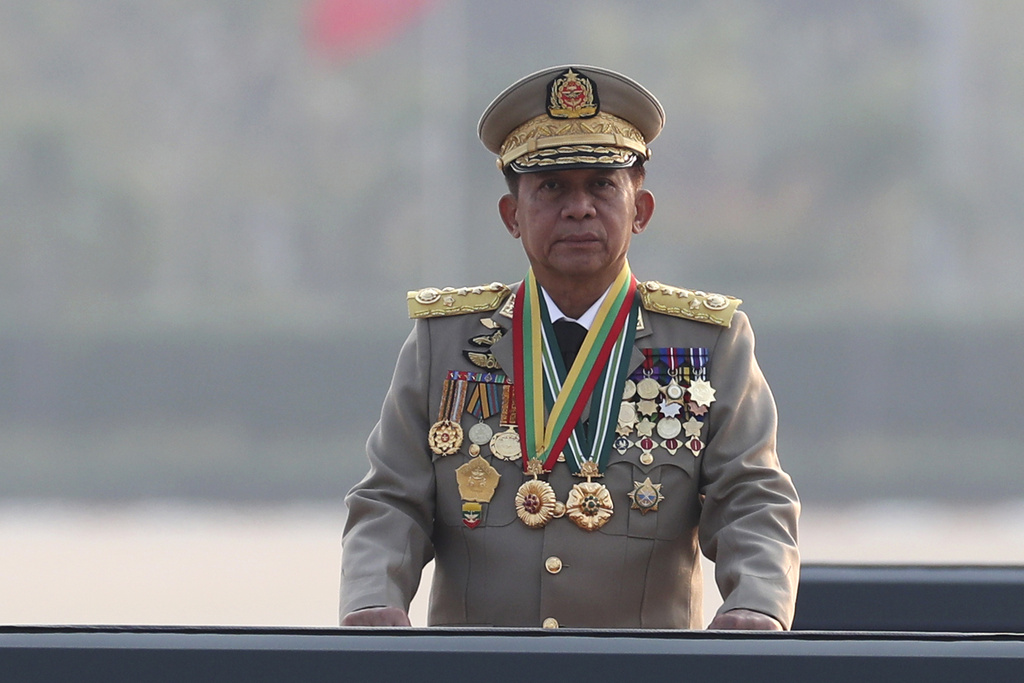The International Criminal Court’s chief prosecutor asked judges on Wednesday to issue an arrest warrant for the head of Myanmar’s military regime for crimes committed against the country’s Rohingya Muslim minority.
Senior Gen. Min Aung Hlaing, who took power from elected leader Aung San Suu Kyi in a coup in 2021, is accused of crimes against humanity for the deportation and persecution of the Rohingya.
Nearly a million people were forced into neighboring Bangladesh to escape what has been called an ethnic cleansing campaign involving mass rapes, killings and the torching of homes.
From a refugee camp in Bangladesh, the court’s top prosecutor, Karim Khan, said in a statement that he intends to request more warrants for Myanmar’s leaders soon.
“In doing so, we will be demonstrating, together with all of our partners, that the Rohingya have not been forgotten. That they, like all people around the world, are entitled to the protection of the law,” the British barrister said.
The allegations stem from a counterinsurgency campaign that Myanmar’s military began in August 2017 in response to an insurgent attack. Hlaing, who heads the Myanmar Defense Services, is said to have directed the armed forces of Myanmar, known as the Tatmadaw, as well as national police to attack Rohingya civilians.
Khan was in Bangladesh where he met with members of the displaced Rohingya population. About 1 million of the predominately Muslim Rohingya live in Bangladesh as refugees from Myanmar, including about 740,000 who fled in 2017.
Rohingyas face widespread discrimination in Buddhist-majority Myanmar, with most denied citizenship. Myanmar’s government refuses to recognize the Rohingya as one of the country’s 135 lawful ethnic minorities, instead calling them Bengalis, with the implication that their native land is in Bangladesh and they are illegally settled in Myanmar.
Human rights groups applauded the decision to seek a warrant. The dire situation of the Rohingya has received less attention as the conflicts in Ukraine and Gaza have grabbed headlines. “The ICC prosecutor’s decision to seek a warrant against Sr. Gen. Min Aung Hlaing comes amid renewed atrocities against Rohingya civilians that echo those suffered seven years ago. The ICC’s action is an important step toward breaking the cycle of abuses and impunity,” said Maria Elena Vignoli, senior international justice counsel at Human Rights Watch.
Zin Mar Aung, foreign minister for Myanmar’s opposition National Unity Government, established by elected lawmakers barred from taking their seats in 2021, said on X that ICC judges should “swiftly issue the warrant” and that governments should “act and enforce this warrant to uphold justice and international law.” She posted that the ICC action “represents a critical moment in Myanmar history.”
Thet Swe, a spokesperson for the military regime, did not immediately respond to requests for comment.
Khan’s request now goes to a panel of three judges who will weigh the evidence provided and determine if a warrant should be issued. There is no deadline for a decision. A request for an arrest warrant for Russian President Vladimir Putin took less than three weeks in 2023 but judges issued warrants for Israeli Prime Minister Benjamin Netanyahu, his former defense minister and Hamas’ military chief more than six months after Khan asked.
Myanmar does not belong to the global court, but Bangladesh does. In 2018 judges at the court ruled the prosecutor could look into crimes which were “completed” on the territory of a member state, such as forcible deportation.
In 2019, Khan’s predecessor, Fatou Bensouda, formally requested to open an investigation into the situation and judges gave the green light for investigations into “any crime, including any future crime” committed at least partly in Bangladesh or another court member state and linked to the Rohingya.
The move paved the way for Khan to pursue crimes beyond forcing men, women and children over the border and into refugee camps.
The request comes days after a powerful rebel group seized a key trading town in northeastern Myanmar on the Chinese border, taking control of a lucrative rare earth mining hub in another setback for the military-led government.
The military seized power from Aung San Suu Kyi’s government in February 2021, triggering intensified fighting with long-established armed militias organized by Myanmar’s ethnic minority groups in its border regions which have struggled for decades for more autonomy.
In 2022, the International Court of Justice, the United Nations’ highest court, advanced a separate case against Myanmar brought by Gambia alleging the Southeast Asian nation is responsible for genocide against the Rohingya. Five European countries and Canada have asked the court to back Gambia in the proceedings.
(AP)











